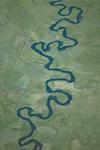- Meander
-
/mee an"deuhr/, n.ancient name of the Menderes.
* * *
Extreme U-bend in a stream, usually occurring in a series, that is caused by flow characteristics of the water.Meanders form in stream-deposited sediments and may stack up upstream of an obstruction, resulting in a gooseneck or extremely bowed meander. A cutoff may form through the gooseneck and allow the former meander bend to be sealed off as an oxbow lake. Silt deposits may eventually fill the lake to form a marsh or a meander scar. Meanders, Owens River, near Mammoth Lakes, Calif.© Barrie RokeachAerial/Terrestrial Photography
Meanders, Owens River, near Mammoth Lakes, Calif.© Barrie RokeachAerial/Terrestrial Photography* * *
▪ river system componentextreme U-bend in the course of a stream, usually occurring in a series. Meanders, named from the Menderes (historically known as the Maeander) River in Turkey, are most often formed in alluvial materials (stream-deposited sediments) and thus freely adjust their shapes and shift downstream according to the slope of the alluvial valley. A meandering channel commonly is about one and one-half times as long as the valley, and it exhibits pools in the meander bends and riffles (shallower zones with more turbulent water flow) in the reaches between the meanders. The length of a meander generally ranges from seven to ten times the channel width.The uneven resistance to erosion of nonhomogenous material causes irregularities in a meandering stream, such as the stacking of meanders upstream of an obstruction. This commonly causes a meander to constrict and form a gooseneck, an extremely bowed meander. A cutoff may form through the gooseneck and allow the former meander bend to be sealed off as an oxbow lake. Silt deposits will eventually fill the lake to form a marsh or meander scar.Subjected to rapid uplift, a meandering stream may cut into bedrock surfaces to produce entrenched or incised meanders. The rock walls thus formed are commonly quite steep and sometimes are symmetrical on both sides of the meander beds.Many explanations have been proposed for meanders, including changes in river stages, local obstructions, rotation of the Earth, and enlargement of previous bends in the channel. Although they are not yet completely understood, meanders are considered a form of wave phenomenon. They represent the most probable channel shape because they minimize such variables as the angle of deflection of the current, the water-surface slope, and the total work of turning done by the river. The latter is the crucial point because natural systems always tend to do least work; water flows downhill rather than uphill and follows a meandering path even on ice, glass (automobile windshields), and within water bodies, such as the Gulf Stream in the Atlantic Ocean.* * *
Universalium. 2010.
